Senate Democratic Caucus | |
|---|---|
 | |
| Part of | United States Senate |
| Chair and Floor Leader | Chuck Schumer (NY) |
| Floor Whip | Dick Durbin (IL) |
| Vice Chairs | Mark Warner (VA) Elizabeth Warren (MA) |
| Secretary | Tammy Baldwin (WI) |
| Ideology | Modern liberalism |
| Political position | Center-left |
| Affiliation | Democratic Party |
| Colors | Blue |
| Seats | 51 / 100 |
| Website | |
| democrats.senate.gov | |
| This article is part of a series on the |
| United States Senate |
|---|
 |
| History of the United States Senate |
| Members |
|
|
| Politics and procedure |
| Places |
The Democratic Caucus of the United States Senate, sometimes referred to as the Democratic Conference, is the formal organization of all senators who are part of the Democratic Party in the United States Senate. For the makeup of the 118th Congress, the caucus additionally includes four independent senators (Bernie Sanders of Vermont, Angus King of Maine, Kyrsten Sinema of Arizona, and Joe Manchin of West Virginia) who caucus with the Democrats, bringing the current total to 51 members. The central organizational front for Democrats in the Senate, its primary function is communicating the party's message to all of its members under a single banner. The present chair of the Senate Democratic Caucus is Chuck Schumer of New York.
Current leadership
[edit]Effective with the start of the 118th Congress, the conference leadership is as follows:
- Senate Majority Leader Chuck Schumer (New York) (Caucus Leader)
- Senate Majority Whip: Dick Durbin (Illinois)
- President pro tempore: Patty Murray (Washington)
- Caucus Vice Chairs: Mark Warner (Virginia) and Elizabeth Warren (Massachusetts)
- Policy Committee Chair: Debbie Stabenow (Michigan)
- Steering Committee Chair: Amy Klobuchar (Minnesota)
- Outreach Committee Chair: Bernie Sanders (Vermont)
- Outreach Committee Vice Chair: Catherine Cortez Masto (Nevada)
- Policy Committee Vice Chair: Joe Manchin (West Virginia) and Cory Booker (New Jersey)
- Caucus Secretary: Tammy Baldwin (Wisconsin)
- Caucus Deputy Secretary: Brian Schatz (Hawaii)
- Campaign Committee Chair: Gary Peters (Michigan)
- Chief Deputy Whip: Jeff Merkley (Oregon)
History
[edit]The conference was formally organized on March 6, 1903, electing a chair to preside over its members and a secretary to keep minutes. Until that time, this caucus was often disorganized, philosophically divided and had neither firm written rules of governance nor a clear mission.
Chairs of the Senate Democratic Caucus
[edit]Since Oscar Underwood's election in 1920, the chair of the Senate Democratic Caucus has also concurrently served as the floor leader as part of an unwritten tradition.
| Congress | Leader | State | Took office | Left office | Majority Leader | ||
|---|---|---|---|---|---|---|---|
| 43rd | 
|
John W. Stevenson (1812–1886) |
Kentucky | December 1873 | March 4, 1877 | No data | |
| 44th | |||||||
| 45th | 
|
William A. Wallace (1827–1896) |
Pennsylvania | March 4, 1877 | March 4, 1881 | ||
| 46th | |||||||
| 47th | 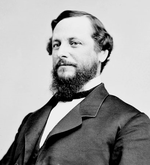
|
George H. Pendleton (1825–1889) |
Ohio | March 4, 1881 | March 4, 1885 | ||
| 48th | |||||||
| 49th | 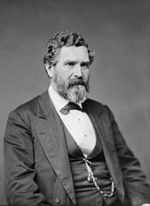
|
James B. Beck (1822–1890) |
Kentucky | March 4, 1885 | May 3, 1890[a] | ||
| 50th | |||||||
| 51st | |||||||

|
Arthur Pue Gorman (1839–1906) |
Maryland | May 3, 1890 | April 29, 1898[b] | Unknown[c] | ||
| 52nd | |||||||
| 53rd | Himself 1893–1895 | ||||||
| 54th | Unknown[c] | ||||||
| 55th | |||||||

|
David Turpie (1828–1909) |
Indiana | April 29, 1898 | March 4, 1899 | |||
| 56th | 
|
James Kimbrough Jones (1839–1908) |
Arkansas | December 1899 | March 4, 1903 | ||
| 57th | |||||||
| 58th | 
|
Arthur Pue Gorman (1839–1906) |
Maryland | March 4, 1903 | June 4, 1906[a] | ||
| 59th | |||||||
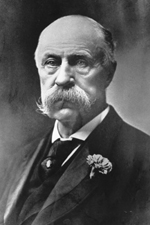
|
Joseph Clay Stiles Blackburn (1838–1918) |
Kentucky | June 4, 1906 | March 4, 1907 | |||
| 60th | 
|
Charles Allen Culberson (1855–1925) |
Texas | December 1907 | December 9, 1909[b] | ||
| 61st | |||||||

|
Hernando Money (1839–1912) |
Mississippi | December 9, 1909 | March 4, 1911 | |||
| 62nd | 
|
Thomas S. Martin (1847–1919) |
Virginia | April 1911 | March 4, 1913 | ||
| 63rd | 
|
John W. Kern (1849–1917) |
Indiana | March 4, 1913 | March 4, 1917 | Himself 1913–1917 | |
| 64th | |||||||
| 65th | 
|
Thomas S. Martin (1847–1919) |
Virginia | March 4, 1917 | November 12, 1919[a] | Himself 1917–1919 | |
| 66th | Lodge 1919–1924 | ||||||

|
Gilbert Hitchcock[d] (1859–1934) |
Nebraska | November 12, 1919 | April 27, 1920 | |||

|
Oscar Underwood (1862–1929) |
Alabama | April 27, 1920 | December 3, 1923 | |||
| 67th | |||||||
| 68th | |||||||
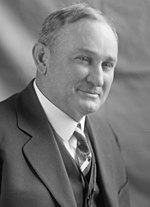
|
Joseph Taylor Robinson (1872–1937) |
Arkansas | December 3, 1923 | July 14, 1937[a] | Curtis 1924–1929 | ||
| 69th | |||||||
| 70th | |||||||
| 71st | Watson 1929–1933 | ||||||
| 72nd | |||||||
| 73rd | Himself 1933–1937 | ||||||
| 74th | |||||||
| 75th | |||||||
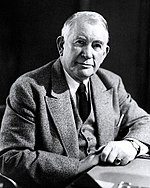
|
Alben W. Barkley (1877–1956) |
Kentucky | July 14, 1937 | January 3, 1949[e] | Himself 1937–1947 | ||
| 76th | |||||||
| 77th | |||||||
| 78th | |||||||
| 79th | |||||||
| 80th | White 1947–1949 | ||||||
| 81st | 
|
Scott W. Lucas (1892–1968) |
Illinois | January 3, 1949 | January 3, 1951 | Himself 1949–1951 | |
| 82nd | 
|
Ernest McFarland (1894–1984) |
Arizona | January 3, 1951 | January 3, 1953 | Himself 1951–1953 | |
| 83rd | 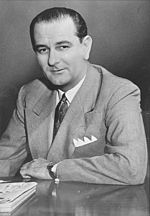
|
Lyndon B. Johnson (1908–1973) |
Texas | January 3, 1953 | January 3, 1961[e] | Taft 1953 | |
| Knowland 1953–1955 | |||||||
| 84th | Himself 1955–1961 | ||||||
| 85th | |||||||
| 86th | |||||||
| 87th | 
|
Mike Mansfield (1903–2001) |
Montana | January 3, 1961 | January 3, 1977 | Himself 1961–1977 | |
| 88th | |||||||
| 89th | |||||||
| 90th | |||||||
| 91st | |||||||
| 92nd | |||||||
| 93rd | |||||||
| 94th | |||||||
| 95th | 
|
Robert Byrd (1917–2010) |
West Virginia | January 3, 1977 | January 3, 1989 | Himself 1977–1981 | |
| 96th | |||||||
| 97th | Baker 1981–1985 | ||||||
| 98th | |||||||
| 99th | Dole 1985–1987 | ||||||
| 100th | Himself 1987–1989 | ||||||
| 101st | 
|
George J. Mitchell (born 1933) |
Maine | January 3, 1989 | January 3, 1995 | Himself 1989–1995 | |
| 102nd | |||||||
| 103rd | |||||||
| 104th | 
|
Tom Daschle (born 1947) |
South Dakota | January 3, 1995 | January 3, 2005 | Dole 1995–1996 | |
| Lott 1996–2001 | |||||||
| 105th | |||||||
| 106th | |||||||
| 107th | Himself 2001 | ||||||
| Lott 2001 | |||||||
| Himself 2001–2002 | |||||||
| Lott 2002–2003 | |||||||
| 108th | Frist 2003–2007 | ||||||
| 109th | 
|
Harry Reid (1939–2021) |
Nevada | January 3, 2005 | January 3, 2017 | ||
| 110th | Himself 2007–2015 | ||||||
| 111th | |||||||
| 112th | |||||||
| 113th | |||||||
| 114th | McConnell 2015–2021 | ||||||
| 115th | 
|
Chuck Schumer (born 1950) |
New York | January 3, 2017 | Incumbent | ||
| 116th | |||||||
| 117th | |||||||
| Himself 2021–present | |||||||
| 118th | |||||||
Notes
[edit]Vice chair
[edit]After the victory of Democrats in the midterm elections of 2006, an overwhelming majority in the conference wanted to reward Chuck Schumer, then the chair of the Democratic Senatorial Campaign Committee, with a position in the leadership hierarchy.[citation needed] In response, then-Democratic Leader Harry Reid created the position of vice-chair when Democrats formally took control in 2007.[1] Schumer ascended to Reid's position following his retirement after the 2016 elections. The position was then split, with one co-chair awarded to Mark Warner and the other awarded to Elizabeth Warren.
- Chuck Schumer (2007–2017)
- Mark Warner and Elizabeth Warren (2017–present)
Caucus secretary
[edit]The United States Senate Democratic Conference Secretary, also called the Caucus Secretary was previously considered the number-three position, behind the party's floor leader and the party's whip, until in 2006, when Democratic leader Harry Reid created the new position of Vice-Chairman of the caucus. Now, the secretary is the fourth-highest ranking position. The conference secretary is responsible for taking notes and aiding the party leadership when senators of the party meet or caucus together.[2]
The first conference secretary was Sen. Edward W. Carmack of Tennessee, who was elected in March 1903.[3]
The current conference secretary is Sen. Tammy Baldwin of Wisconsin, who assumed the office in January 2017.
| Officeholder | State | Term |
|---|---|---|
| Edward W. Carmack | 1903–1907 | |
| Robert Owen | 1907–1911 | |
| William E. Chilton | 1911–1913 | |
| Willard Saulsbury Jr. | 1913–1916 | |
| Key Pittman Acting |
1916–1917 | |
| William H. King | 1917–1927 | |
| Hugo Black | 1927–1937 | |
| Joshua B. Lee | 1937–1943 | |
| Francis T. Maloney | 1943–1945 | |
| Brien McMahon | 1945–1952 | |
| Thomas Hennings | 1953–1960 | |
| George Smathers | 1960–1966 | |
| Robert Byrd | 1967–1971 | |
| Ted Moss | 1971–1977 | |
| Daniel Inouye | 1977–1989 | |
| David Pryor | 1989–1995 | |
| Barbara Mikulski | 1995–2005 | |
| Debbie Stabenow | 2005–2007 | |
| Patty Murray | 2007–2017 | |
| Tammy Baldwin | 2017–present |
Deputy Caucus Secretary
[edit]On December 8, 2022, Sen. Brian Schatz of Hawaii was elected to the newly created position of Deputy Caucus Secretary, assuming the office at the beginning of the 118th Congress on January 3, 2023.[4] This was an elevation from his previous leadership role as Senate Democratic Chief Deputy Whip.
References
[edit]- ^ Bolton, Alexander (January 20, 2021). "Schumer becomes new Senate majority leader". The Hill. Retrieved January 23, 2021.
- ^ "Conference Secretaries". U.S. Senate.
- ^ "Senate Democratic Caucus Organized". U.S. Senate.
- ^ "Schumer reelected as Senate majority leader". The Hill.
Bibliography
[edit]- Donald A. Ritchie (ed) (1999). Minutes of the Senate Democratic Conference: Fifty-eighth through Eighty-eighth Congress, 1903-1964. Washington, D.C. GPO. Available online in PDF or text format.
External links
[edit]- Official Home of the Senate Democratic Caucus on the Internet
- Senate Party Leadership – much of this article's content was adapted from this useful public domain resource
- First Formal Organization of the Senate Democratic Caucus
| |||||||||||||||||||||||||||
| National conventions, presidential tickets, and presidential primaries |
| ||||||
|---|---|---|---|---|---|---|---|
| Presidential administrations |
| ||||||
| U.S. House leaders, Speakers, and Caucus chairs |
| ||||||
| U.S. Senate leaders and Caucus chairs |
| ||||||
| Chairs of the DNC |
| ||||||
| State and territorial parties |
| ||||||
| Affiliated groups |
| ||||||
| Related | |||||||